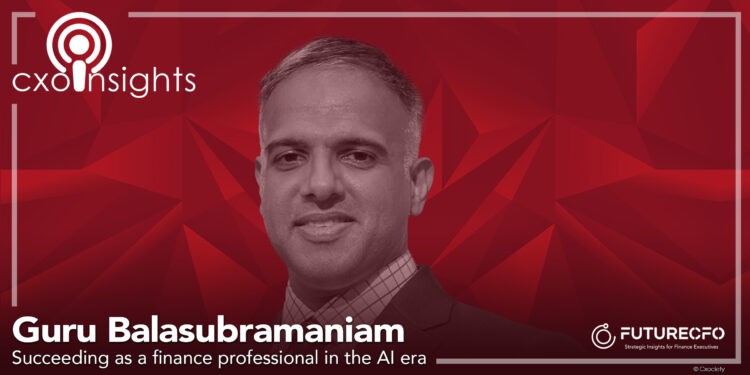As Asia's finance leaders navigate an era defined by artificial intelligence, evolving ESG mandates, and data-driven decision-making, the role of the CFO is no longer confined to stewardship—it is increasingly strategic.
In 2025, the finance function is being reshaped not just by new tools, but by new expectations. According to Guru Balasubramaniam, chairman of CIMA Hong Kong SAR Area Committee , "professional certification and continuous education are no longer merely advantageous—they are fundamental to relevance, competence, and career progression."
This sentiment echoes across boardrooms and professional bodies alike. A 2024 PwC Global Finance Trends Survey found that 78% of Asian CFOs now prioritise upskilling in digital finance capabilities, with data analytics and AI literacy topping the list.
Against this backdrop, certifications like CIMA are evolving from static credentials into dynamic pathways for lifelong learning.
AI won't replace you
But your skill set must evolve. While AI automates routine tasks such as reconciliation and reporting, it does not eliminate the need for finance professionals—it redefines it.

"AI works on our own dataset," notes Balasubramaniam. "The quality of our data will be the base of the quality of the output."
This shifts accountability back to finance teams, who must now master data governance, predictive analytics, and data integrity.
Deloitte's 2025 Asia-Pacific CFO Programme reinforces this: finance leaders who combine technical fluency with strategic insight are 2.3 times more likely to be involved in enterprise-wide decision-making.
The challenge lies not in resisting automation, but in adapting to it.
As Balasubramaniam observes, "You're not going to lose your job, but you would have to shift your skill set."
Skills beyond numbers
Technical proficiency alone is no longer sufficient. The modern finance leader must be a communicator, influencer, and ethical guardian. "Soft skills are what got me here so far," says Balasubramaniam. "You have to be able to influence decision makers who don't speak finance lingo."
This aligns with EY's 2025 'Building the CFO of the Future' report, which identifies emotional intelligence, cross-functional collaboration, and storytelling with data as the top soft skills for finance leaders.
In culturally diverse markets like Asia, where communication styles vary significantly across jurisdictions, the ability to translate complex financial insights into actionable business language is paramount.
Moreover, integrity and ethics remain non-negotiable. With rising scrutiny on corporate conduct and ESG disclosures, finance professionals are the "gatekeepers" of organisational trust.
As Balasubramaniam stresses, "We need to be strong in ethics and believe in doing things the right way." CIMA's updated syllabus now embeds ethical reasoning across all levels, reflecting a broader industry shift.
Learning that fits
Time is the scarcest resource for finance professionals. With back-to-back meetings, reporting cycles, and strategic initiatives, traditional learning models are often impractical. The solution? Flexible, modular, and just-in-time education.
Balasubramaniam advocates for micro-credentials and digital badges—focused learning units on topics like AI, ESG, or cybersecurity.
"Instead of a full qualification, you can choose a micro-credential depending on your focus," he says. These bite-sized qualifications enable professionals to upskill without disrupting their careers.
This trend is gaining momentum. ACCA and CIMA have partnered with universities and online platforms, such as Coursera, to offer stackable credentials.
According to a 2025 Gartner study, 65% of finance professionals in Singapore and Hong Kong prefer micro-learning formats over traditional classroom settings, citing flexibility and relevance as key drivers.
Virtual classrooms, AI-powered tutors, and on-demand content are making continuous learning more accessible than ever. "You can now ask AI questions around your qualification rather than wait for a teacher," notes Balasubramaniam, highlighting how technology is not just disrupting finance but also enabling its development.
ESG: From voluntary to vital
Environmental, Social, and Governance (ESG) reporting is no longer optional. In jurisdictions like Hong Kong, Japan, and Singapore, regulators are mandating climate-related disclosures aligned with the IFRS Sustainability Disclosure Standards. For finance teams, this means mastering new frameworks, data collection methods, and assurance processes.
Balasubramaniam urges proactive engagement: "Act and get the understanding. Take the courses." CIMA offers targeted ESG modules that cover Scope 1, 2, and 3 emissions, carbon accounting, and sustainability assurance, enabling finance professionals to lead in this space.
KPMG's 2025 Asia ESG Survey reveals that 70% of companies now involve finance in ESG data validation, up from 42% in 2022. This underscores the growing expectation for accountants to ensure accuracy and transparency in non-financial reporting. As stewards of data integrity, finance leaders are uniquely positioned to drive credible ESG narratives.
Employers must invest
Continuous learning cannot be shouldered by individuals alone. Organisations must create ecosystems that support growth.
Balasubramaniam highlights CIMA's Employer Partner Programme, which recognises companies that commit to staff development through accreditation tiers—Trainer Quality Partner, Development Quality Partner, and Premier levels.
Such collaborations yield tangible benefits. A 2024 McKinsey study found that companies with structured learning partnerships report 30% higher retention rates among finance talent. "Employers have a holistic approach to career development," says Balasubramaniam. "They're developing future-ready teams, not just filling roles."
Forward-thinking firms are offering exam leave, tuition support, and career progression linked to certification. This alignment between professional bodies and employers ensures that learning is not only accessible but also recognised and rewarded.
Be a specialist
In an age of information overload, generalists risk irrelevance. Balasubramaniam's advice? "Be the specialist, be the one the company goes to." With competing priorities—such as AI, blockchain, cybersecurity, and data privacy—finance professionals must curate their learning.
"Choose the ones relevant to your business," he advises. This strategic focus enables individuals to develop in-depth expertise and become internal consultants.
PwC's 2025 Skills for the Future report identifies niche competencies—such as AI governance, digital audit trails, and sustainable finance—as high-demand areas where specialists command premium roles.
Curiosity, not just competence, is the differentiator. "You're never done learning," Balasubramaniam reminds us. "I've always been an inquisitive person. That curiosity is key."
Click on the PodChats player to hear Balasubramaniam's perspectives on succeeding as a finance professional in the AI era.
- With AI automating core tasks (reconciliation, reporting), which advanced technical skills (data science, predictive analytics, blockchain auditing) will become essential for accountants to remain indispensable in 2025/2026?
- How can professionals effectively navigate the cost barrier of prestigious certifications while managing living expenses in high-growth but sometimes lower-wage Asian economies?
- What innovative learning formats will best address the severe time constraints faced by working professionals across Asia?
- Beyond technical skills, which critical 'soft' skills will be paramount for finance leaders in Asia's diverse markets?
- How can professional bodies and employers better collaborate to make continuous learning genuinely integrated, affordable, and recognised within career progression paths?
- With ESG reporting becoming mandatory in more Asian jurisdictions, how can accountants swiftly gain the necessary expertise in sustainability accounting frameworks and assurance?
- What strategies are most effective for maintaining the relevance and portability of my existing qualifications in the face of rapid technological and regulatory changes across different Asian markets?
- How will the rise of alternative credentials complement or challenge traditional accountancy certifications?
- What ethical considerations and new risk management competencies are emerging due to increased data usage, AI in finance, and cybersecurity threats specific to the Asian operational context?
- What is your advice for finance professionals in the AI digital era?
- How should a finance professional approach the fear of losing relevance with AI?




